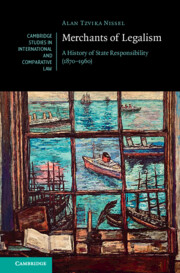Book contents
- Merchants of Legalism
- Cambridge Studies in International and Comparative Law: 190
- Merchants of Legalism
- Copyright page
- Dedication
- Epigraph
- Contents
- Acknowledgments
- Prologue
- 1 The Responsibilities of States in International Law
- 2 The US Turn to the Technique of International Arbitration
- 3 The Creation of State Responsibility in the New World
- 4 International Responsibility as German Philosophy
- 5 State Responsibility as World Order
- Epilogue
- Bibliography
- Index
- Cambridge Studies in International and Comparative Law
Epilogue
From State Responsibility to the Responsibility of States
Published online by Cambridge University Press: 19 December 2024
- Merchants of Legalism
- Cambridge Studies in International and Comparative Law: 190
- Merchants of Legalism
- Copyright page
- Dedication
- Epigraph
- Contents
- Acknowledgments
- Prologue
- 1 The Responsibilities of States in International Law
- 2 The US Turn to the Technique of International Arbitration
- 3 The Creation of State Responsibility in the New World
- 4 International Responsibility as German Philosophy
- 5 State Responsibility as World Order
- Epilogue
- Bibliography
- Index
- Cambridge Studies in International and Comparative Law
Summary
In the Epilogue, I take a step back to offer a few generalizations about the history of state responsibility. First, I reconceptualize the growth of state responsibility in terms of three overlapping phases: (1) pre-legalism; (2) ad hoc legalism; and (3) institutional legalism. I then consider some themes common to US, German and other approaches to state responsibility. One idea that runs through all three narratives is the consequentiality of breaking the law. When a state violates its international obligations, there should be a consequence for its conduct. What that “responsibility” should mean was, of course, an open question. Another noticeable pattern is that state responsibility was a fundamentally exceptional doctrine. Whatever the purported general rule, the doctrine has consistently provided considerable room for exceptions. Yet, while the UN–codified doctrine does not predict state behavior, it remains a critical legal framework. The codification of state responsibility as secondary rules has provided international society with an argumentative tradition for questioning and judging any type of state conduct.
Keywords
- Type
- Chapter
- Information
- Merchants of LegalismA History of State Responsibility (1870–1960), pp. 299 - 327Publisher: Cambridge University PressPrint publication year: 2024

